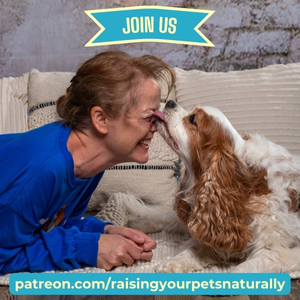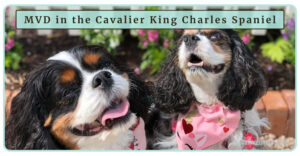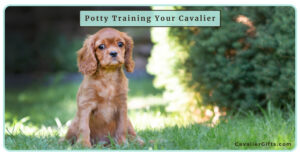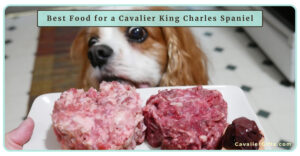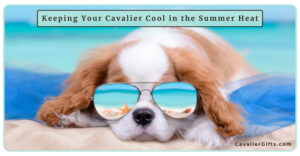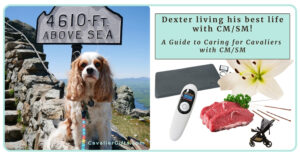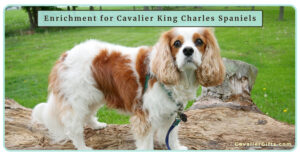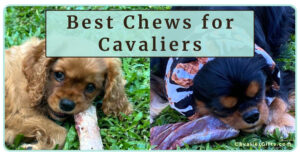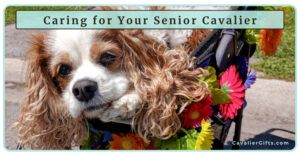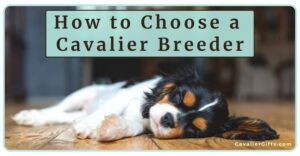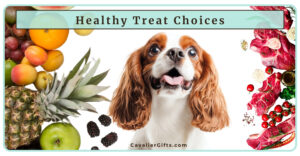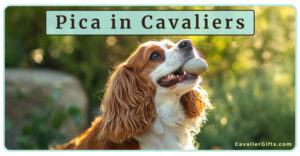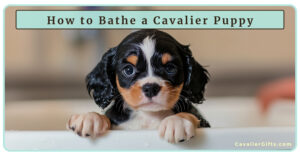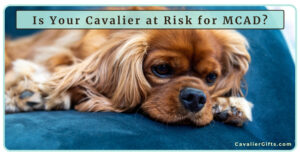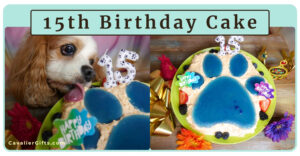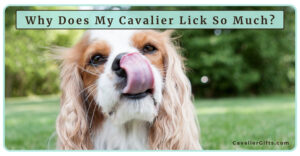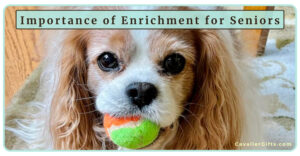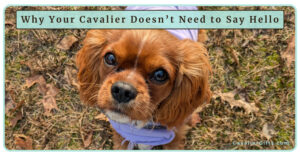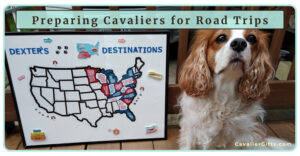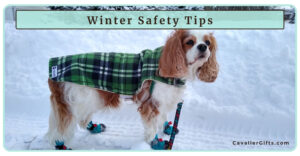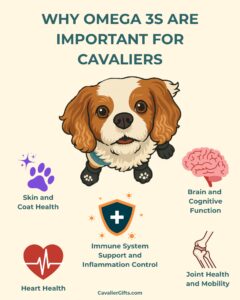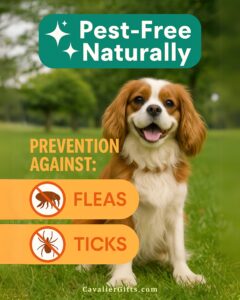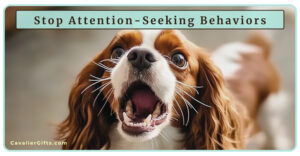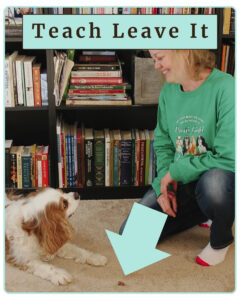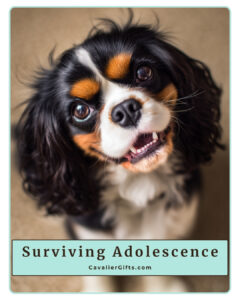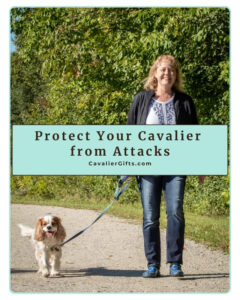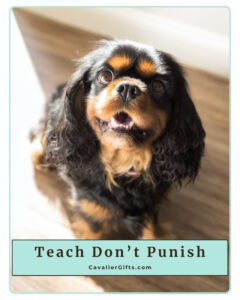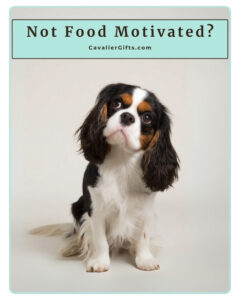Natural Diet for Cavalier King Charles Spaniel
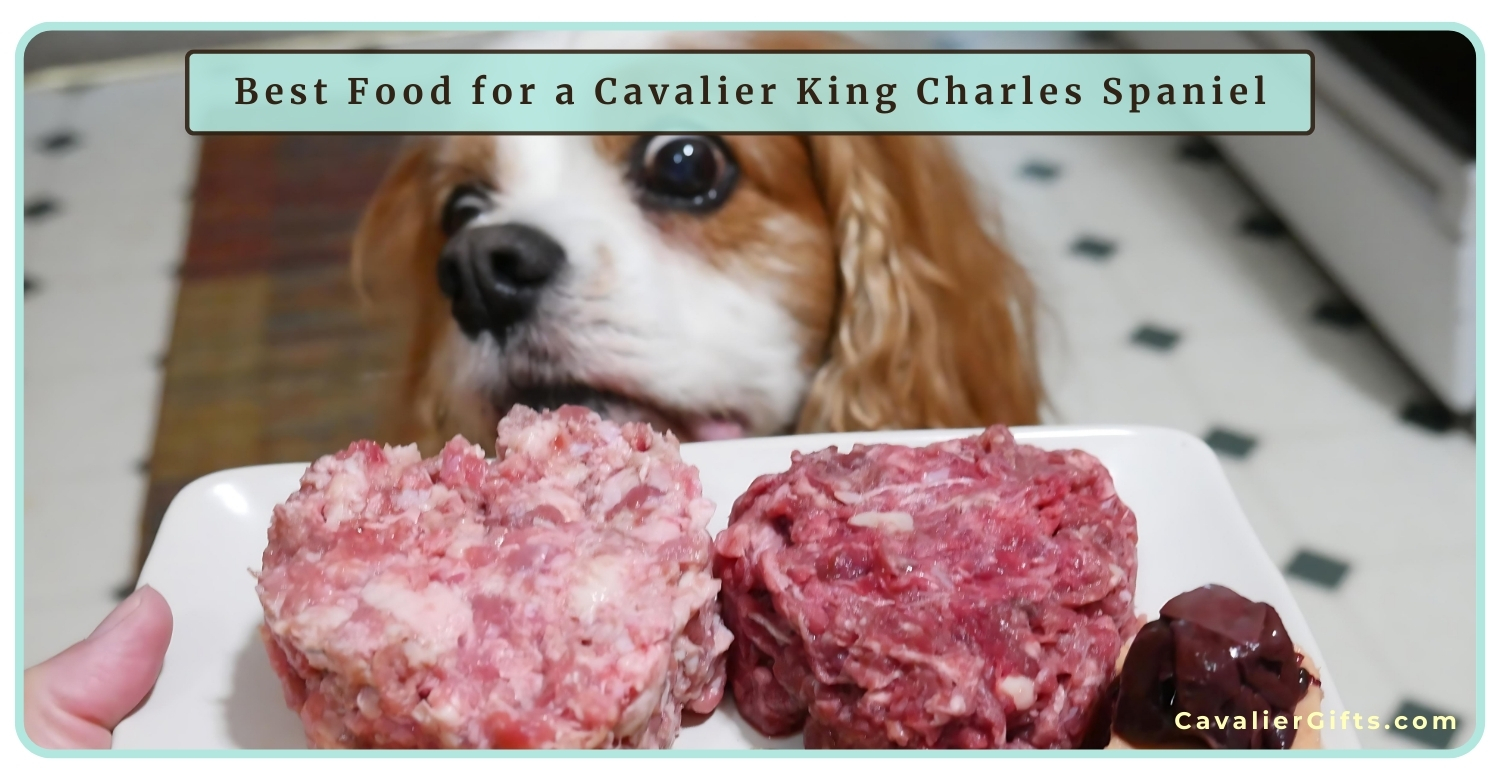
Dexter’s Food Journey with Raw and Homemade Food
Dexter, my Cavalier King Charles Spaniel, was a raw-fed puppy. However, because I wasn’t sure how to do it properly, and I was unaware that there were premade raw foods on the market, I fed him kibble with food toppers. After learning about how to balance a fresh dog food diet, I started to home cook for him when he was around two. Then, when he was about four, I transitioned him to a DIY raw diet. Through this journey with Dexter, I’ve learned about creating a nutritious and tailored diet that meets his unique needs. Now, I’m excited to pass along my tips and thoughts on feeding your Cavalier King Charles Spaniel. Let’s dive in!
Natural diet for Cavalier King Charles Spaniels
If you’re anything like me, you’re always on the lookout for the best pet products, natural dog grooming supplies, and the healthiest dog food brands for your Cavalier. One of the most important aspects of your Cavalier’s well-being is their diet. Dogs are natural carnivores, made to thrive on a diet of fresh meat. This means a species-appropriate diet is key to their health and vitality.
Understanding Species-Appropriate Nutrition
Let’s think about our dogs’ ancestors for a moment. They thrived on a diet of raw meat, bones, and organs. Today, we can recreate this natural diet with a raw food approach, using fresh, high-quality ingredients that focus on what dogs are meant to eat. For your Cavalier King Charles Spaniel, in a nutshell, this means focusing on a diet that’s about 90 percent meat, bone, and organ, with the remaining 10 percent coming from fruits and vegetables. This balance provides the essential nutrients and fiber they need to stay healthy. Personally, I feel if you aren’t able to go raw, this diet can also be cooked. You just would need to provide the calcium from the bones in another form, since dogs cannot eat cooked bones.
Don’t forget to subscribe to @CavalierTipsandFun for more!
The Problem with Processed Dry Kibble
Now, dry kibble. It’s processed at high temperatures, which takes away almost all the moisture and nutrients from the ingredients. Often, kibble is made with low-quality ingredients and fillers that don’t give your dog the nutrients they need. The lack of moisture in kibble can also lead to chronic dehydration, affecting everything from kidney function to skin and coat health. Plus, since kibble is made to last a long time, the ingredients can go rancid quicker than you might think, making it even less nutritious for your pup.
The Importance of Moisture in Your Dog’s Diet
Moisture is a crucial part of your dog’s diet. In the wild, dogs get most of their hydration from the food they eat. Fresh, raw diets naturally provide the moisture that kibble just can’t. This is essential for your dog’s digestion, kidney health, and overall well-being. By feeding them fresh, high-quality meat and vegetables, you’re making sure they stay hydrated naturally, without having to depend solely on drinking water.
Google Ad Below
Finding the Best Diet for Your Cavalier King Charles Spaniel
When it comes to our Cavaliers, there’s no one-size-fits-all solution. Every dog is unique, with their own health needs, behaviors, and lifestyle. Personally, I’m a big advocate for variety. This could be in the form of different proteins, suppliers or even a nice pre-made raw or mix. I steer clear of dry pet food altogether unless I’m using freeze dried food for dog training treats. For me, a balanced DIY raw diet for Dexter is the way to go. It’s fresh, it’s healthy, and I can tailor and tweak it to Dexter’s needs.
Why a Raw Food Diet is Ideal for Most Cavalier King Charles Spaniels
A raw food diet is as close to a natural diet as you can get for your Cavalier. It includes raw meat, bones, and organs, providing essential vitamins and minerals often lost in commercial dog foods. This diet can improve your Cavalier’s skin and coat health, immune system, and help maintain a healthy weight. As I mentioned earlier, I think adding an approximately 10 percent mix of fruits and vegetables is a great way to add a nutritional boost to the bowl. By avoiding the fillers and artificial additives found in many commercial foods, we ensure our dogs get the best nutrition possible.
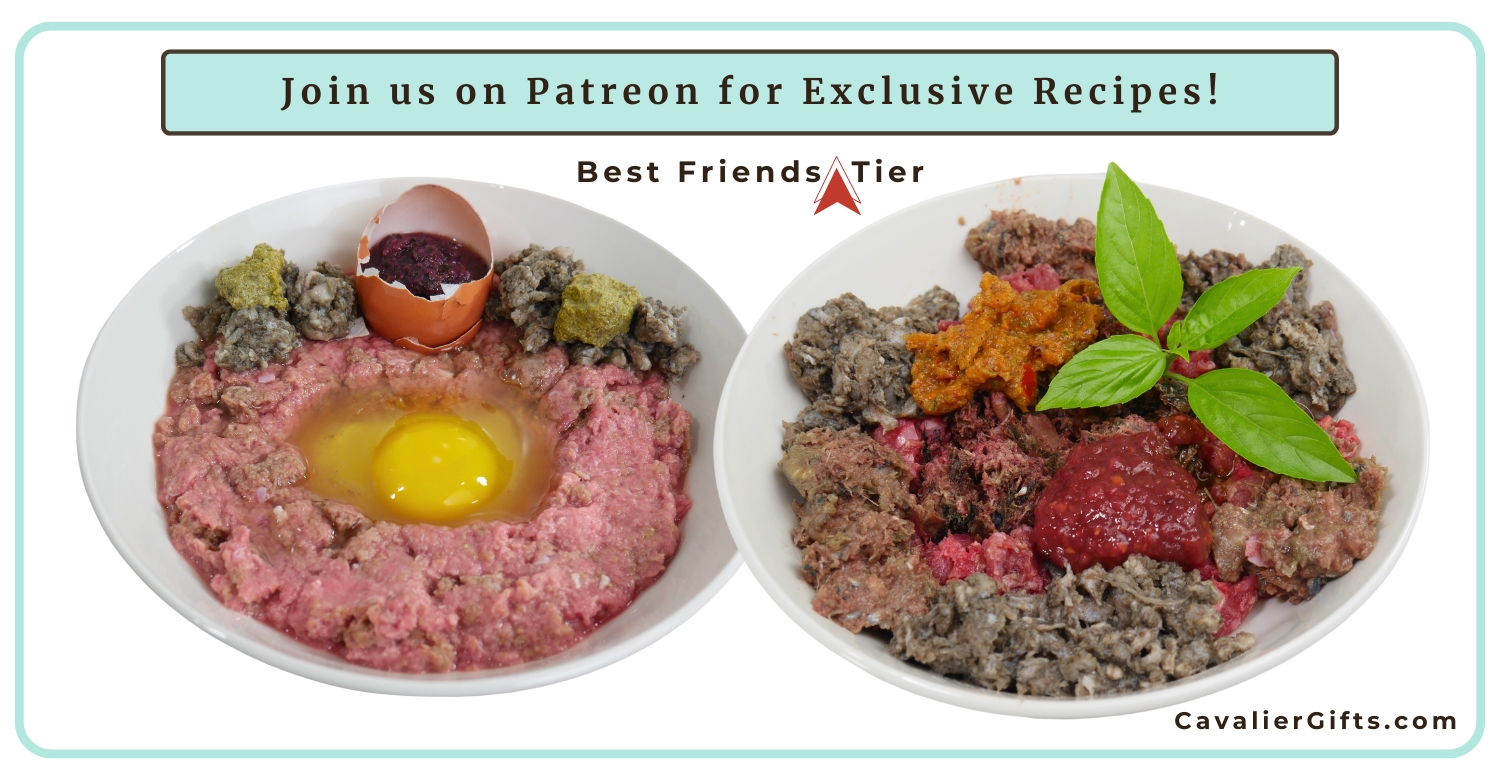
Homemade Raw or Cooked Food: Personalized Nutrition for Your Cavalier
One of the best ways to ensure your Cavalier King Charles Spaniel is eating the healthiest diet is to make their food at home. This way, you control the quality of the ingredients and can tailor the meals to your dog’s specific needs. Homemade meals are especially beneficial if your Cavalier is a picky eater or has food allergies. Just remember to balance their diet properly to include all necessary nutrients. Whether your dog has allergies, digestion issues, or any other specific needs, you can tweak their diet to meet their needs.
Feeding Your Cavalier a Grain-Free Diet
You might have heard that grain-free foods are bad for Cavaliers because they were thought to have caused Dilated Cardiomyopathy (DCM). In 2019, the FDA released a list of grain-free pet foods that had people swearing that grain-free dog food was bad. But, guess what? It’s really not the case. In fact, in 2022 the FDA announced on their website there wasn’t a solid link between grain-free diets and DCM.
Feeding your dog grain-free can actually be a good choice for your Cavalier. But things get tricky if you are looking at a purchased grain-free alternative, particularly a dry kibble. When you’re reading the ingredient panel of a dog food (yes, read those labels), watch out for ones loaded with peas, lentils, legumes, seeds, and/or potatoes. Even if the front of the bag screams “meat-first,” it might sneak in a bunch of carbs and starches that aren’t ideal. According to experts, such as Dr. Karen Becker, it’s not about cutting out grains—it’s about making sure our pets aren’t eating too many starchy fillers. So, bottom line? Go back to that 90 percent meat recommendation.
Feeding Your Cavalier King Charles Spaniel Puppy
When it comes to feeding your Cavalier King Charles Spaniel puppy, it’s essential to consider their unique nutritional needs as they grow. If you’re not quite sure about the specifics of puppy nutrition, it’s perfectly okay to rely on trusted commercial brands known for their expertise in creating a balanced diet for puppies.
A commercial raw puppy food will include the essential proteins, fats, and calcium your puppy needs to develop strong bones. The key is to ensure whatever you choose is well-rounded and provides all the nutrients your Cavalier puppy requires during the puppy life stage.

Maintaining a Healthy Weight
Keeping your Cavalier at his ideal weight is super important. Maintaining a healthy weight isn’t just about good looks, but their health. Extra weight can contribute to health issues like joint problems and heart disease. The breed standard says they should weigh between thirteen and eighteen pounds. But, Cavaliers can vary a lot in size. Take Dexter, for instance. He’s a bit of a big guy, weighing his ideal weight at a healthy twenty-nine pounds. So, how do you know if your Cavalier is at the right weight? It’s all about getting your hands on your dog. Run your fingers lightly over their ribcage; you should be able to feel their ribs without pressing too hard. If they’re too prominent, they might be on the thin side. But if you can’t feel them at all, or if their waistline has disappeared, they might be carrying a few extra pounds. Just keep an eye on their overall body shape, and remember, every Cavalier is unique!
How Often to Feed Your Cavalier King Charles Spaniel
Consistency is key when it comes to feeding your Cavalier. Establishing a regular feeding schedule helps regulate their metabolism and digestion. Typically, feeding your Cavalier twice a day, in the morning and evening, works well. For puppies, more frequent meals might be necessary to meet their higher energy demands. I actually feed Dexter three times a day, mainly due to the fact that he gets so much food, I prefer to space it out.
Adding Supplements and Vitamins
Even with a well-balanced diet, supplements can play an essential role in your Cavalier’s health. Omega-3 fatty acids can enhance skin and coat health, probiotics can aid digestion, and joint supplements can support mobility. Always consult your Cavalier’s vet before adding new supplements to ensure they’re necessary and safe. When possible, opt for real food supplements vs. synthetic.
Food Allergies in Cavalier King Charles Spaniels
If your Cavalier has allergies, a limited-ingredient fresh diet can be incredibly beneficial. Before jumping brands, I would suggest going through a pet food elimination diet to identify triggers. Once you know what your Cavalier is allergic to, you can create a personalized diet just for him. You can read more about how and why a pet food elimination diet is helpful on my other blog, right here.

Safe Fruits and Vegetables to Feed Your Cavalier
Things like carrots, broccoli, and kale can be great sources of extra nutrients and fiber. And don’t forget the powerhouse of antioxidants fruits like blueberries, strawberries, pomegranates, and apples can provide. For best digestion, blitz them up! Introduce all new foods slowly and keep an eye on what works for your dog.
Transitioning to a Raw Food Diet
Transitioning your Cavalier to a raw food diet should be done gradually to avoid digestive upsets. Start by introducing small amounts of raw food while slowly decreasing their current food. A 75 percent and 25 percent switch usually works well. Over a week or two, increase the raw portion until it completely replaces their old diet.
Choosing the Best Raw Food Brands
Selecting high-quality raw food brands for your Cavalier ensures they get balanced and nutritious meals. Personally, I look for brands that offer meats that are antibiotic and hormone free. Ideally, any fruits and vegetables will be organic. Opt for whole foods vs synthetics when possible. But, it will be a balancing act based on what’s available to you and your budget. As I mentioned earlier, shoot for approximately 90 percent meat, bone, and organ. A few raw brand choices to consider include BJ’s Raw, Raw Paws Pet Food, Raw Wild, We Feed Raw, Primal, Vital Essentials, Smallbatch, Raw Bistro and Steve’s Real Food.

A Healthy Diet Can Improve the Immune System, Skin, and Coat Health
By providing your Cavalier with a balanced raw or homemade diet you’re not just filling their bowl, you’re nurturing their well-being from the inside out. Fresh diets, whether raw or homemade, are rich in unprocessed ingredients, offering a higher concentration of vital nutrients compared to heavily processed kibble. Fresh foods do not have the fillers and additives found in kibble, making them easier for dogs to digest and absorb. Because of this, fresh food promotes better immune function, healthier skin, and a shinier coat, making them the ideal choice for your Cavalier.
By focusing on a fresh, natural diet tailored to your Cavalier King Charles Spaniel’s specific needs, you’re setting them up for a long, healthy, and happy life. Remember, my goal is to offer guidance and support to help you navigate the journey of pet nutrition, without any judgment. Let’s work together to ensure the best possible care for you and your Cavalier!
Your comments and questions are always welcome below.
Join our vibrant Cavalier King Charles Spaniel community on Facebook, support our dedication to pet wellness on Patreon, and stay updated with our weekly newsletter for invaluable tips and insights into raising happy, healthy pets. Together, let’s make a difference in our dogs’ lives!
|
|

|
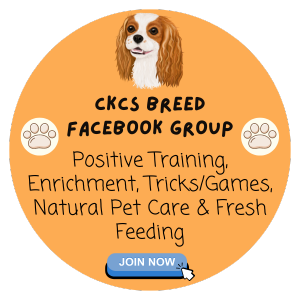
|
Google Ad Below

